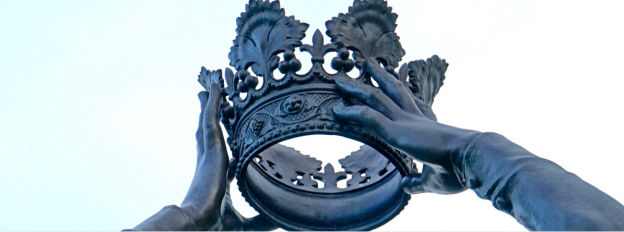Despite the riches, the pomp, and all the people running around to serve you, I think it must be hard coming to terms with one day becoming King (or Queen). The weight of expectation that one day, after your parent dies, you step into their shoes. Difficult enough for (then) Prince Charles and Prince William to bear, but what about young Prince George?
Thankfully for most of us, our path at birth is not as clear to us. But for some, it is. Samson, the final judge in the Book of Judges, grew up knowing he had a special destiny. In Judges 13, God’s dramatic power to provide a saviour for Israel from birth is demonstrated to a common man and his wife. The passage reminds us of our need for saving from our sins, and that God provided that salvation through Jesus, appointed our Saviour from birth.
As should have become painfully familiar to us as we work through Judges, “the people of Israel again did what was evil in the sight of the LORD” (v.1) so were again subjected to outside oppression as discipline, this time from the Philistines for forty years.
However, unlike previous examples in Judges, the people do not cry out. They are used to oppression. It feels normal to have a foreigner rule over them, rather than freedom bounded only by God’s Law. They do not know they need saving.
Despite this lack of repentance, this lack of a need for salvation, God still graciously intervened. He did this miraculously, for the man named Manoah and his unnamed wife had no children (v.2). Like Sarah, Rachel, Rebekah, and later Hannah, Manoah’s wife was barren.
Unlike other judges who were appointed by God (or man) later in life, Samson’s appointment came at birth. The focus on Samson’s birth story makes it clear that Samson is special in a particular way.
The Angel of the LORD appeared to Manoah’s wife, and pointed out that despite her barrenness, she would conceive and bear a son (v.3). She is specifically warned at this point not to drink wine or eat unclean food, or shave his head (vv.4-5) because he will be a Nazirite from birth (Numbers 6:1-8).
The wife failed to recognise this as The Angel of the LORD, but dutifully reported this announcement with her husband Manoah (vv.6-7).
Manoah prayed to God, asking for another visit to confirm the details and God graciously obliged (vv.8-9). When the Angel of the LORD again appeared to Manoah’s wife, she went and grabbed Manoah to speak to him (vv.10-11).
Expressing faith in the announcement they would become parents, Manoah asked what the child’s manner of life and mission would be (v.12). Instead of answering directly, the Angel points out he has already told his wife and repeats the instructions for Manoah’s wife’s pregnancy (vv.13-14).
Sadly Manoah seems a bit slower than his wife, and offers a meal to the Angel who rejects it but is willing to accept a burnt offering to God (BIG HINT; vv.15-16). Again, the Angel rejects a request for a name, because it is too wonderful (vv.17-18).
Only when Manoah offered the burnt offering, and the Angel of the LORD ascended upon it, did he realise who he was talking to (vv.19ff). Both fell to the ground in reverent fear and worship (v.20).
While Manoah worried that he was for smiting having seen God (and not recognising him!), Manoah’s wife had more spiritual sense (v.22). She recognised that the promises and an accepted burnt offering meant God’s gracious favour, not his judgement, would come to them (v.23).
Sure enough, God’s promise was fulfilled and baby Samson was born, blessed by God (v.24). As he grew, God’s Spirit began to stir him, to unsettle him compared to his settled docile Israelite brethren at their state (v.25). Mighty works, like that hinted at in the Angel of the LORD ascending the burning flame of the altar to heaven, would ensue.
He would be such because Israel did not know that they needed saving. In our natural state, we too are the same. Our slavery to sin feels normal. We have got used to it. We do not cry out, because we do not feel our need. We need to be unsettled by the Holy Spirit.
That unsettling should leave us searching for a saviour. The one also born in miraculous circumstances, whose parents were visited by a heavenly messenger. Jesus, who was wholly devoted to God all his days, and was appointed from birth to save God’s People from their sins.
God can do this because he is a miracle worker. The God whose name is wonderful is a gracious God, who does not smite us despite our sinfulness and lack of spiritual sense and his holiness, and answers prayers just as he answered Manoah by returning once again to Manoah and his wife.
Samson’s birth to judge Israel reminds us of our need: for Jesus, a saviour from birth.

